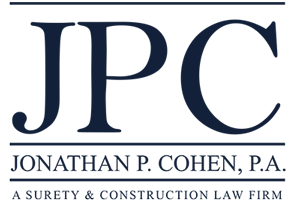Are you tired of waiting for plan reviews and building inspections? Maybe it’s time to consider a private provider. There are multiple advantages to hiring private providers for plan reviews and building inspections for construction projects, including speeding up the process and accountability when things go wrong. Florida construction lawyer Jonathan P. Cohen, Esq. helps clients to navigate the complexities of major construction projects, including contracts with private building inspectors.
Private providers in Florida
Under §553.791, Fla. Stat. (2021), fee owners are allowed to use private providers for plan reviews or building inspections. Private providers must generally be licensed engineers or architects, although other licensed professionals are allowed but only to complete building inspections for additions to residential property and modifications of up to 1,000 square feet. This means that fee owners are not restricted to only using building officials to complete inspections or review plans.
Benefits of using private providers for plan reviews and building inspections
There are multiple advantages of using private providers instead of building officials, including the following:
- Plan reviews and construction can be completed much faster.
- When private providers conduct thorough inspections, the risk of defect and warranty claims will be reduced.
- Private providers normally review plans and work together with the contractors on the job site for better coordination.
- Using a private provider can help projects move faster without lengthy delays, productivity losses, and profit losses.
- Private providers add an additional layer of quality control and help to improve workmanship.
- Private providers that commit violations can be disciplined as licensed professionals.
- Private providers are required to carry professional liability insurance.
Sovereign immunity vs. liability
Building officials have sovereign immunity under Trianon Park Condominium Ass’n. v. City of Hialeah, 468 So. 2d. 912 (Fla. 1985). In that case, owners of condominium units sued the Hialeah building inspectors that had negligently inspected the building and certified it. The Florida Supreme Court found that the City of Hialeah and its building inspectors had sovereign immunity and could not be held liable for their negligence.
By contrast, private building inspectors and plan reviewers must carry professional liability insurance with high minimum liability limits of $1 million per occurrence or $2 million total for projects worth up to $5 million or $2 million per occurrence or $4 million total for projects worth $5 million or more. If the liability limits are insufficient for a project, the owner can ask for the private provider to increase the coverage amount.
Registration of and contracts with private providers
Property owners can enter into written contracts with private providers. If an owner intends to use a private provider to review the plans, the building official might also require the owner to use a private provider for building inspections. Private providers are generally required to register with building departments to ensure that they have the required insurance, and their licenses are in good standing.
If the property owner provides written authorization to the contractor, the contractor can then use a private building inspector and to pay the private provider directly for the services.
When private providers review plans, they must sign an affidavit under oath that the plans comply with the relevant building codes. Construction cannot be started until the permit is issued. Once the affidavit is filed, the building official will have a deadline of 30 business days to review them. This deadline can be tolled if the building official gives the private provider a notice of deficiency, which will then give the building official an additional five days to review any revisions the private provider makes to the plans.
When an election to use a private provider must be made
Property owners or their authorized contractors can choose to use private providers when they apply for the permit, within seven days before the initial building inspection, or no less than seven days before the next inspection when the building official cannot perform an inspection in a timely manner. What is considered timely is not defined in the Florida Building Code or the state statutes. However, Broward County has interpreted the Florida Building Code as requiring building inspections by the following day after a request made before noon or two days after a request made after noon.
Notice of the election to use a private provider
If a property owner elects to use a private provider, the owner must make the election by sending a notice to the building official. The owner must sign the form and post it at the site of the project. The notice must include the private provider’s name, contact information, qualifications, and licensure. It must also include a list of services the private provider will provide and a certificate of the provider’s professional liability insurance. Finally, the notice must include an indemnification of the building department by the owner. If the owner changes private providers or the scope of the private provider’s work, the property owner must update the notice within one business day.
Inspections
Private providers cannot perform inspections on projects requiring notices of commencement until after the notices are filed. Private providers will be required to perform any inspection that would otherwise be required of the building official. They must notify the building official of all inspections they intend to perform and their expected dates. The building official is allowed to perform site visits to confirm that the private provider is performing the required inspections. Once the private provider performs an inspection, the inspection must be recorded and posted at the site with an indication of whether it passed or failed. The building official must then be notified within two days of the private provider drawing his or her conclusions. However, building officials normally waive the requirement to report after each inspection and instead requires private providers to submit all inspection records at once with a certification of compliance and either a request for a certificate of occupancy or completion. The building official will then have two days to identify any deficiencies or issue the certificate of completion or occupancy. If the building official finds that the construction does not comply with the building codes, the certificate of completion or occupancy can be denied. The building official can also issue an order to stop work on the project. The private provider can then either submit a corrected request for a certificate of completion or occupancy or meet with the building official within two days to try to resolve the dispute. If the dispute cannot be resolved, the private provider can then file an appeal to the board of appeals. If no resolution is reached, the provider can then appeal the decision to the Florida Building Commission.
Talk to an experienced Florida construction lawyer
Using private providers for plan reviews and building inspections offers multiple advantages. Fee owners and contractors that are interested in retaining private providers to perform plan reviews and building inspections might want to talk to an experienced Florida construction lawyer at the law firm of Jonathan P. Cohen, P.A. We have years of experience helping clients with all types of construction matters. Call us today at (954) 462-8850 to schedule a consultation.
The information provided in this article does not, and is not intended to, constitute legal advice.
The content in this article is presented for general informational purposes only.

